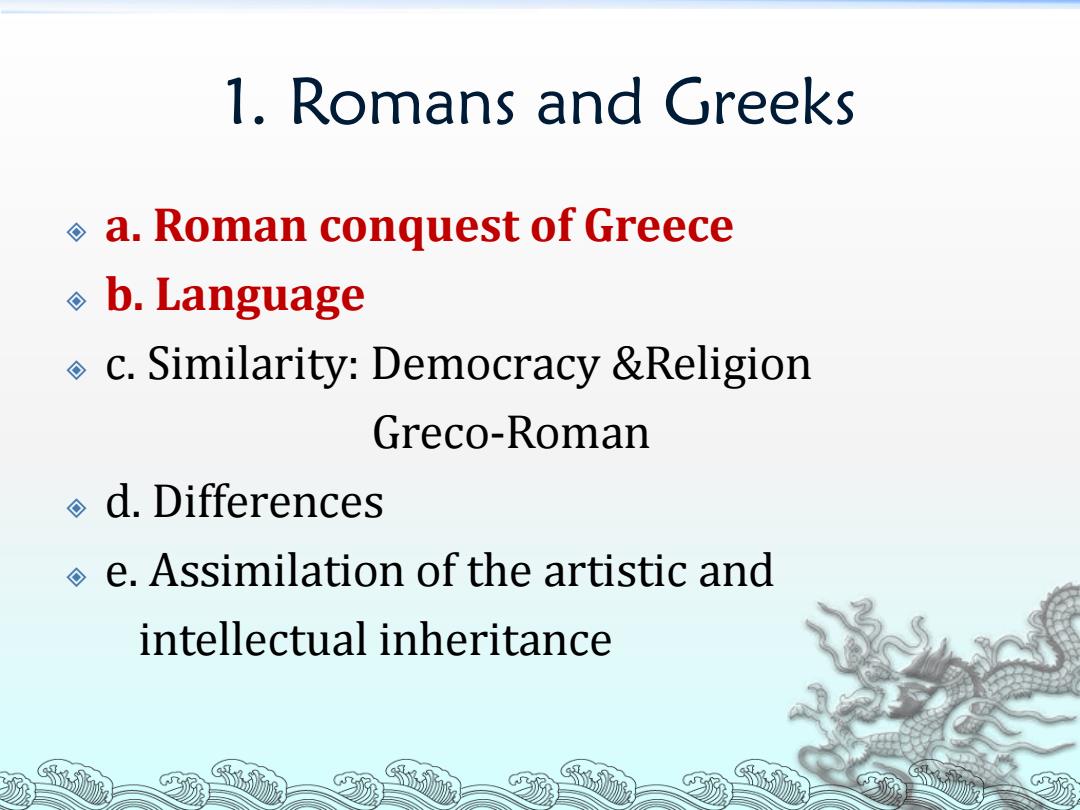
Il.Roman Culture 1.Romans and Greeks 。2.Roman History 3.Latin Literature 4.Architecture,Painting and Sculpture
II. Roman Culture 1. Romans and Greeks 2. Roman History 3. Latin Literature 4. Architecture, Painting and Sculpture

She-wolf:sculptured in 500 B.C. According to legend,Rome was founded in 753 BC by Romulus and Remus,who were raised by a she-wolf
2 sculptured in 500 B.C. According to legend, Rome was founded in 753 BC by Romulus and Remus, who were raised by a she-wolf. (

1.Romans and Greeks o a.Roman conquest of Greece b.Language c.Similarity:Democracy &Religion Greco-Roman d.Differences e.Assimilation of the artistic and intellectual inheritance
1. Romans and Greeks a. Roman conquest of Greece b. Language c. Similarity: Democracy &Religion Greco-Roman d. Differences e. Assimilation of the artistic and intellectual inheritance

Gods with different names In Greek mythology In Roman mythology Zeus宙斯 Jupiter朱庇特 Hera赫拉 Juno朱诺 Athene雅典娜 Minerva Aphrodite阿芙洛狄缇 Venus Hades哈得斯 Pluto Poseidon波塞冬 Neptune Dionysus狄俄尼索斯 Bacchus巴科克斯 Heracles赫拉克勒斯 Hercules
Gods with different names In Greek mythology In Roman mythology Zeus 宙斯 Jupiter 朱庇特 Hera 赫拉 Juno 朱诺 Athene 雅典娜 Minerva Aphrodite 阿芙洛狄缇 Venus Hades 哈得斯 Pluto Poseidon 波塞冬 Neptune Dionysus 狄俄尼索斯 Bacchus 巴科克斯 Heracles 赫拉克勒斯 Hercules

The map of extent of the Roman Empire Oceanus Germanicus Britannia Germania Germania Sarmatia inf. Belgica Germania Lugdunensis sup. Raetia Oceanus Atlanticus GALLIA Gallia Noricum Pannonia Dacia Aquitania Cisalpina ILLYRIUM Gallaecia Narbonensis Dalmatia Moesia Moesia inf. Pontus Euxinus sup. et Asturia Terraconensis Corsical Roma Mare Adrialicum ITALIA Thracia Macedonia HISPANIA Bithynia Mare Pontus Sardinia Armenia Lusitania ● Baleares Tyrrhenum Epirus ASIA Galdla Cappadocia Phrygia 3 Baetica Numidia Sicilia Achaia Mare Cilicia inf. Aegaeum Lycia Africa Mauretania Numidia Syria MAREINTERNUM Mesopotamia sup. proconsularis Palestina Cyrenaica Aegyptus Arabia
The map of extent of the Roman Empire

2.Roman History a.Roman law:452-451 B( b.the year 27 B.C. -Octavius c..the Pax Romana d.Declination (4th cen.) B合百 十二铜表法
2. Roman History a. Roman law : 452-451 BC b. the year 27 B.C. -- Octavius c. . the Pax Romana d. Declination (4th cen.)

Twelve tables/Law of Twelve tables TABLE I Procedure:for courts and trials TABLE II Trials,continued. ◇ TABLE II Debt TABLE IV Rights of fathers (paterfamilias)over the family TABLE V Legal guardianship and inheritance laws TABLE VI Acquisition and possession TABLE VII Land rights TABLE VIII Torts and delicts (Laws of injury) ⊙ 民事侵权行为与侵权行为 TABLE IX Public law公共法 TABLE X Sacred law宗教法 TABLE XI Supplement I前五表的补充 TABLEX从 Supplement II后五表的补充
Twelve tables/ Law of Twelve tables TABLE I Procedure: for courts and trials TABLE II Trials, continued. TABLE III Debt TABLE IV Rights of fathers (paterfamilias) over the family TABLE V Legal guardianship and inheritance laws TABLE VI Acquisition and possession TABLE VII Land rights TABLE VIII Torts and delicts (Laws of injury) 民事侵权行为与侵权行为 TABLE IX Public law公共法 TABLE X Sacred law宗教法 TABLE XI Supplement I前五表的补充 TABLE XII Supplement II后五表的补充

Goddess of justice(original:Justitia正义/司法女神朱斯提提亚) Themis(希神)西弥斯 (司法与正义的女神) 而 THEMIS
Goddess of justice (original : Justitia正义/司法女神朱斯提提亚) Themis (希神)西弥斯(司法与正义的女神)

3.Latin Literature a.Prose: Marcus Tullius Cicero (106-43 BC) Julius Caesar (102-44 BC) b.Poetry: Lucretius (93-50 BC)
3. Latin Literature a. Prose: Marcus Tullius Cicero (106-43 BC) Julius Caesar (102-44 BC) b. Poetry: Lucretius (93-50 BC)

a.Prose 1)Marcus Tullius Cicero (106-43B.C.):noted for his oratory and fine writing style (eloquent oratorical). Selected readings:pp.39-41 ◇ 2)Julius Caesar (102/100?-44B.C.):once dictator in Rome He recorded what he did and saw in the various military campaigns he took part in and these writings,collected in his Commentaries are models of succinct Latin,in which he used language with economy and ferocity. Veni,vidi,vici (I came,I saw,I conquered.)
a. Prose 1) Marcus Tullius Cicero (106-43B.C.): noted for his oratory and fine writing style (eloquent & oratorical). Selected readings: pp. 39-41 2) Julius Caesar (102/ 100?- 44B.C.): once dictator in Rome He recorded what he did and saw in the various military campaigns he took part in and these writings, collected in his Commentaries are models of succinct Latin, in which he used language with economy and ferocity. Veni, vidi, vici (I came, I saw, I conquered.)